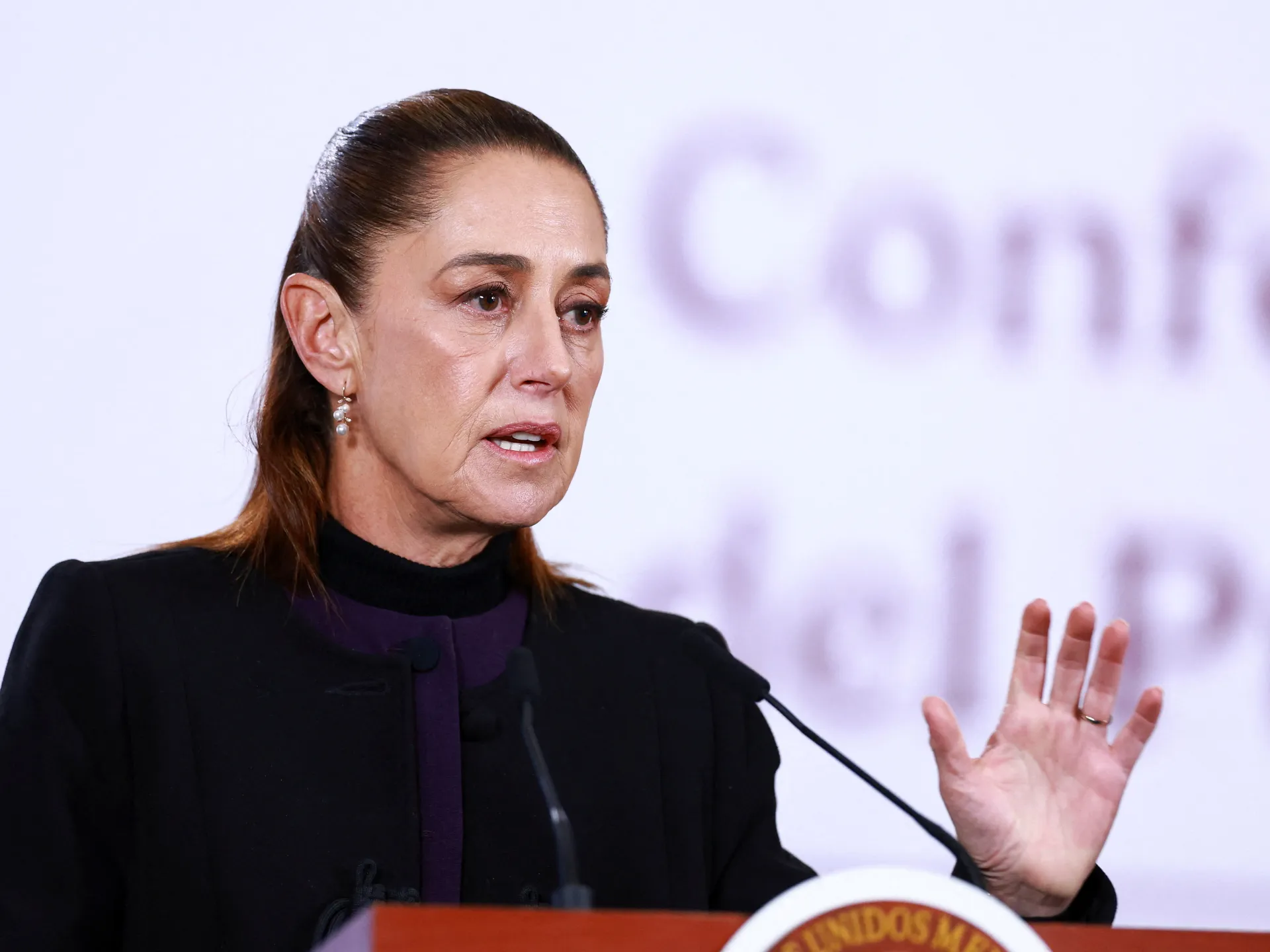Mexico’s Claudia Sheinbaum considers legal action after Elon Musk criticism | Crime News
Mexico’s President Claudia Sheinbaum has warned she could take possible legal action following comments from right-wing tech billionaire Elon Musk, accusing her of ties to cartels.
At her morning news conference on Tuesday, the president was asked for her response to Musk’s statements a day prior. Musk had described her as being beholden to the cartels.
Recommended Stories
list of 3 itemsend of list
“Well, we are considering whether to take any legal action,” she began. “The lawyers are looking into it.”
She then proceeded to describe the allegations that she leads a “narco-government” as “absurd” and demonstrably false.
“It falls apart all on its own,” she said, dismissing the accusation as hackneyed. “They don’t even know what to invent any more, right? Honestly, it’s laughable.”
Sheinbaum has faced criticism for her national security policies following a spate of cross-country violence over the weekend.
Killing of El Mencho
The violence erupted after the death on Sunday of a top cartel leader, Nemesio Oseguera Cervantes, known by the nickname El Mencho.
The Mexican military had tracked El Mencho to the town of Tapalpa in central Mexico. He died while en route to medical care after being shot by authorities.
Members of El Mencho’s criminal organisation, the Jalisco New Generation Cartel, responded to the news of his death with road blocks, arson and clashes with security forces. Dozens of people were killed in the violence.
Musk was among the online commentators criticising Sheinbaum’s handling of Mexico’s security in the aftermath of the attacks.
His posts came in response to a video clip circulating on social media, showing Sheinbaum advocating for alternatives to the militaristic “war on drugs” approach.
“She’s just saying what her cartel bosses tell her to say,” Musk wrote in response to the video.
“Let’s just say that their punishment for disobedience is a little worse than a ‘performance improvement plan’.”
A vocal critic of left-wing governments like Sheinbaum’s, Musk is closely aligned with United States President Donald Trump, who has likewise pushed for more military action against cartels.
In September, for instance, Trump’s State Department listed Mexico as an area of concern for drug-trafficking and outlined steps it expected to see to address the issue.
“Much more remains to be done by Mexico’s government to target cartel leadership, along with their clandestine drug labs, precursor chemical supply chains, and illicit finances,” the State Department wrote.
“Over the next year, the United States will expect to see additional, aggressive efforts by Mexico to hold cartel leaders accountable and disrupt the illicit networks engaged in drug production and trafficking.”
Trump himself has accused Sheinbaum of inefficacy in her campaign to crack down on illicit drug trafficking.
“She’s not running Mexico. The cartels are running Mexico,” Trump told Fox News in the hours after launching a January 3 military operation to abduct Venezuelan President Nicolas Maduro.
“She’s very frightened of the cartels. They’re running Mexico. I’ve asked her numerous times, ‘Would you like us to take out the cartels?’”
Sheinbaum has repeatedly refused the prospect of unilateral US intervention, arguing it would violate Mexican sovereignty. Still, Trump has repeatedly warned that the US is considering military strikes on Mexican soil.
“Something’s going to have to be done with Mexico,” he told Fox News.
Upping the pressure
Sheinbaum, however, has defended her administration’s track record. Faced with US tariffs in February 2025, she deployed nearly 10,000 members of Mexico’s National Guard to the country’s northern border to crack down on fentanyl trafficking.
She has also taken targeted military actions against cartels, though she has argued that the process should be focused on prosecuting criminals, rather than killing them in law enforcement operations.
Her administration has also overseen the extradition of dozens of Mexican nationals suspected of crimes in the US. In January 2025, for instance, 37 people were sent to the US. In April and August, groups of 13 and 14 suspects were transferred, respectively.
Sunday’s capture and killing of El Mencho was the fulfilment of a decades-long goal for the Mexican government, which has long sought his arrest.
Still, on Monday, Trump briefly posted a message on his Truth Social platform indicating that he expected Sheinbaum to do more.
“Mexico must step up their effort on Cartels and Drugs,” he wrote in a post that was later removed.
Sheinbaum, meanwhile, used Tuesday’s news conference to dismiss the criticism as out of touch with what was happening in Mexico. She added that what matters to her is the opinion of the Mexican people, not Musk.
“The vast majority of people recognise the work of the armed forces and the work we are doing every day, not only in security, but for the good of the country, for the wellbeing of all Mexicans,” she said. “That is what will guide us.”
